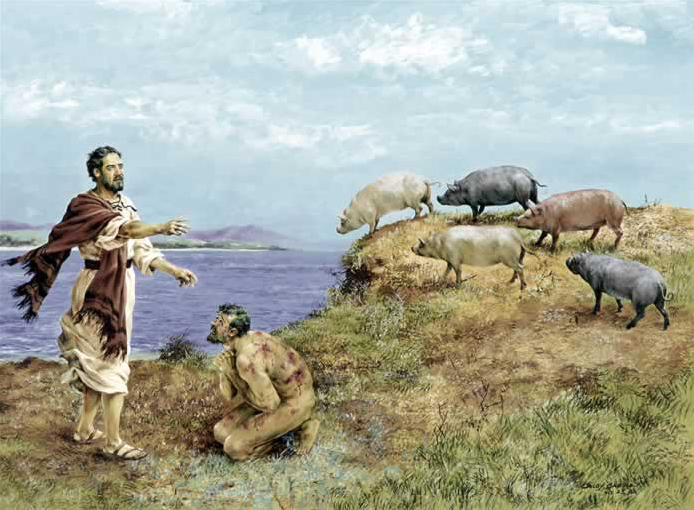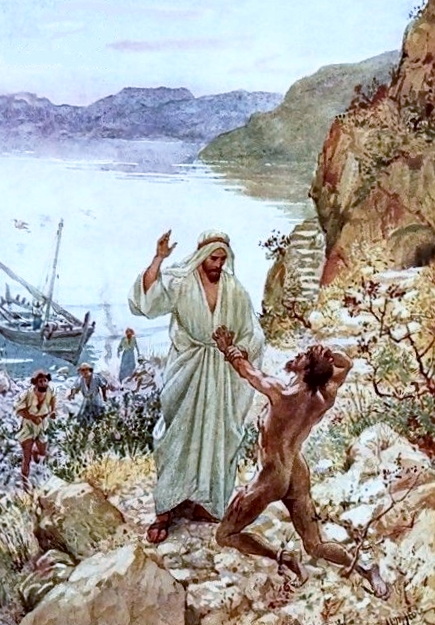
Editor’s note: The following comprises the fourth chapter, third part (C11), of The Gospel of Luke: An Exposition, by Charles R. Erdman (published 1936). All spelling in the original.
11. A Demoniac Healed (8:26-39)
___________________________________________________
26 And they arrived at the country of the Gerasenes, which is over against Galilee. 27 And when he was come forth upon the land, there met him a certain man out of the city, who had demons; and for a long time he had worn no clothes, and abode not in any house, but in the tombs. 28 And when he saw Jesus, he cried out, and fell down before him, and with a loud voice said, What have I to do with thee, Jesus, thou Son of the Most High God? I beseech thee, torment me not. 29 For he was commanding the unclean spirit to come out from the man. For often-times it had seized him: and he was kept under guard, and bound with chains and fetters; and breaking the bands asunder, he was driven of the demon into the desert. 30 And Jesus asked him, What is thy name? And he said, Legion; for many demons were entered into him. 31 And they entreated him that he would not command them to depart into the abyss. 32 Now there was there a herd of many swine feeding on the mountain: and they entreated him that he would give them leave to enter into them. And he gave them leave. 33 And the demons came out from the man, and entered into the swine: and the herd rushed down the steep into the lake, and were drowned. 34 And when they that fed them saw what had come to pass, they fled, and told it in the city and in the country. 35 And they went out to see what had come to pass; and they came to Jesus, and found the man, from whom the demons were gone out, sitting, clothed and in his right mind, at the feet of Jesus: and they were afraid. 36 And they that saw it told them how he that was possessed with demons was made whole. 37 And all the people of the country of the Gerasenes round about asked him to depart from them; for they were holden with great fear: and he entered into a boat, and returned. 38 But the man from whom the demons were gone out prayed him that he might be with him: but he sent him away, saying, 39 Return to thy house, and declare how great things God hath done for thee. And he went his way, publishing throughout the whole city how great things Jesus had done for him.
___________________________________________________
The sufferings of a demoniac were so similar to those of mental disease that by many they are regarded as identical. Those who observe the distinction are faced with a further problem as to whether demon possession exists at the present day. What is most important of all is to note the exact parallel existing between the demoniacs described in the New Testament and those persons who at all times are tormented by envy and lust and anger and greed and other evil passions which dominate the human soul.
On the eastern shore of the Lake of Gennesaret Jesus was encountered by a man whose suffering and nakedness are types of the anguish and shamelessness of sin. He could not be controlled; he was dwelling among the tombs, and these, too, are pictures of the helplessness and loneliness and hopelessness which evil passions produce. Most of all it is interesting to note that while the demon cried out in dread, the man drew near to Jesus, really hoping for help. The experience was like that of those who suffer from mental disease where a dual consciousness is manifested. Likewise most of us have experienced such a conflict of desires; we have longed for liberty at the very moment when we have felt the controlling power of some passion. Some tell us that we must cease to love the sin before Christ will give us help, but this picture sketched by Luke gives a more hopeful message. It intimates that as we cry out for relief, or even before we speak, Jesus sees the heart and recognizes the longing and assures release.
Jesus asked the sufferer for his name. He wished the real man to be awakened and to be conscious of the distinction between himself and the evil spirit by which he was possessed. The reply of the demoniac was full of pathos. He declared that his name was “Legion,” the reason assigned being that “many demons were entered into him.” His case was particularly desperate; but the evil spirits realized that they stood before One whose power was absolute. Certain that they were to be expelled from the sufferer, they asked permission to enter into a herd of swine which was feeding on the mountain side. A question has often been raised as to why Jesus granted this request. Probably one reason was that the sight which followed assured the sufferer of his cure; another may have been that the destruction of the herd would give to the men of the region an arresting message both of their own peril and of the power of Christ. However, when “They went out to see what had come to pass,” they were full of terror and they requested Jesus to leave their land. They were evidently more concerned for the beasts which had been lost than for the soul that had been saved, when they saw their countryman sitting clothed and in his right mind as a disciple at the feet of Jesus. Their request was granted; our Lord never continues the gracious manifestations of his presence when these are not desired. However, he refused the request of the man whom he had healed. The latter wished to accompany Jesus as he entered the boat to cross to the other side of the lake; but Jesus bade him to remain as a witness for Christ in his own home and among his own people. It is ever the desire of the Master that the testimony of those who have known his power should be given first to those by whom they are best known.
(Go back to previous chapter)
(Continue to next chapter)









